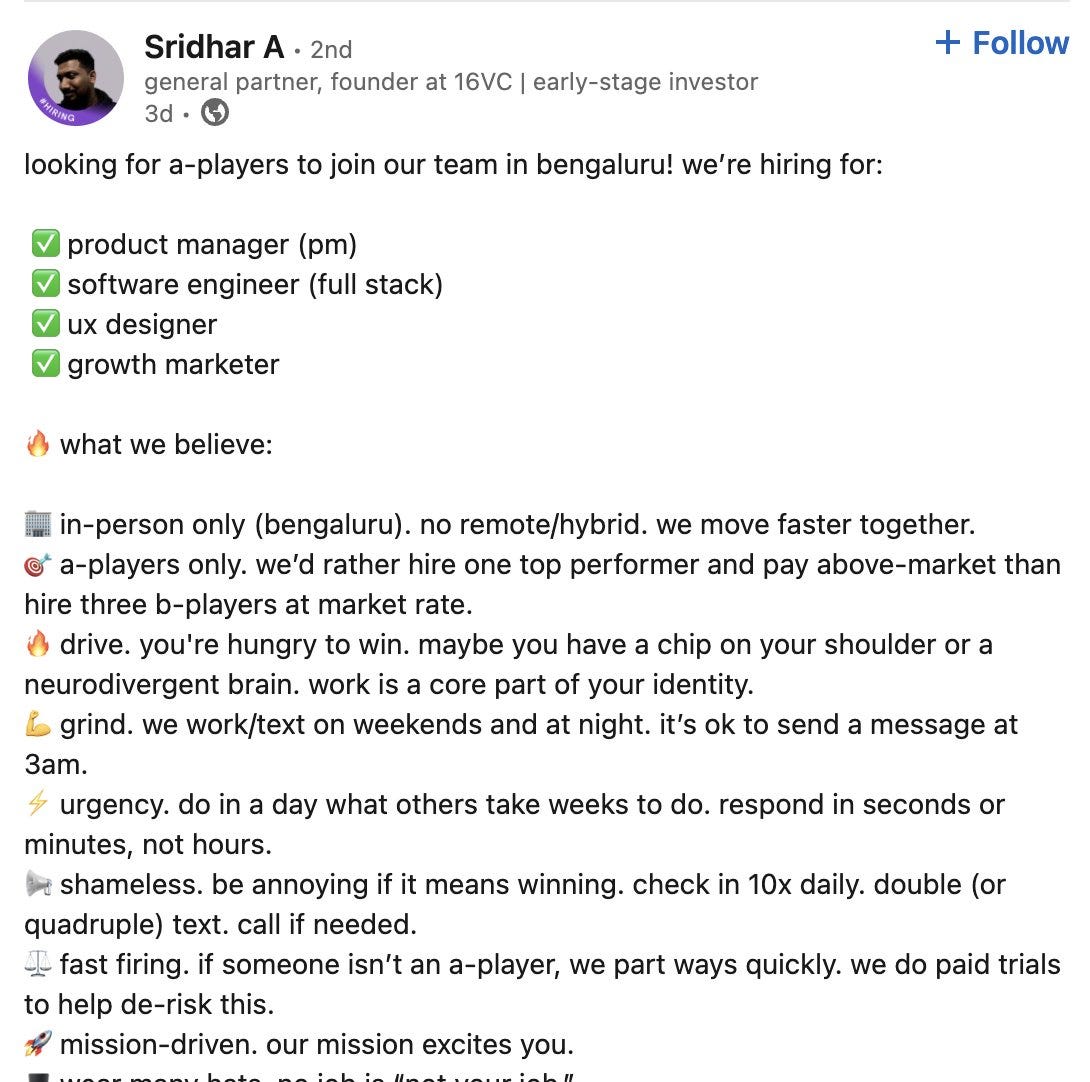Will you apply for this unpaid job?
be honest
Hey! Monday is over, and now we are starting Tuesday with a controversial topic.
Let’s talk about the job posting that broke the internet, well, at least on LinkedIn, X, and Reddit.
Bengaluru-based Sridhar Arunagiri, founder of the asset management firm 16VC, recently posted a job listing that immediately sparked controversy.
The reason?
He was hiring for four roles: Product Manager, Software Engineer, UX Developer, and Growth Marketer, but with one major catch: the roles were unpaid until candidates “matched all the checklist.”Yep, you read that right. Work first, get paid later, maybe.
The job listing that had everyone talking
Sridhar’s LinkedIn post detailed the hiring process, making it clear that 16VC was only looking for “top performers” who had to work from their Bengaluru office, with no remote or hybrid options.
“This is not a 9-to-5,” he wrote. “This is a high-speed, high-impact opportunity for those who want to build something massive.”
But the most shocking part? The disclaimer: “This is an unpaid role until you match all the checklist.”
He elaborated, saying, “We’re not hiring anyone just because they have the right skills on paper or some outdated projects. Come join us, prove what you can do in a real environment, and from the next month, we’ll make it paid.”
And just like that, the backlash rolled in.
The blowup
It didn’t take long for netizens to slam the job listing. One X (formerly Twitter) user summed it up:
“Post keeps getting worse with every line.”
Another didn’t hold back:
“Labour exploitation wrapped into motivational trash.”
Others pointed out that this hiring model isn’t just unethical but also legally questionable. Several users even accused the firm of defrauding candidates with fake job offers in the past.
But why are people angry?
Unpaid internships and trial periods are nothing new, but they remain highly controversial.
Companies often argue that they help filter out unqualified candidates and ensure only the best get paid.
But critics say it’s a way to exploit desperate job seekers, especially in an economy where employment is becoming more competitive.
In fact, unpaid internships have been a longstanding debate globally.
According to a study by the Economic Policy Institute, unpaid internships significantly disadvantage lower-income candidates who can’t afford to work for free, leading to further economic inequality.
“If you can’t pay your workers, you don’t need workers. You need volunteers,” a Reddit user quipped.
Even in India, while unpaid internships are common, expecting full-time employees to work for free until they “match a checklist” is unheard of. Legal experts suggest that this model could violate labor laws, particularly if work expectations mirror those of a paid employee.
So, what lesson can you learn from 16VC?
Skills vs. Exploitation: While it’s fair for companies to test candidates, making them work for free indefinitely is exploitative.
Company Culture Matters: Job seekers today don’t just look at paychecks, they look at company ethics. A hiring post like this can damage a firm’s reputation permanently.
Know Your Rights: If a company expects unpaid work that resembles a full-time job, you might want to think twice before signing up.
The 16VC job listing debacle is a reminder that in a world increasingly advocating for fair pay and employee rights, companies need to step up and not step on talent.
So, that’s it for today. If you enjoyed this edition, subscribe to hear from us every day!
See ya 👋




